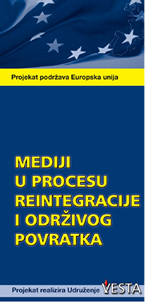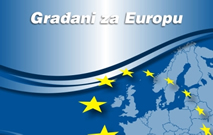The importance and role of the media in the process of sustainable return and reintegration in Bosnia and Herzegovina
 According to Branko
Todorović of the Helsinki Committee of Republika Srpska, it is highly important
to critically assess the role of the media in Bosnia and Herzegovina in the
development of a democratic society, but also in the development of something
that can be called the reintegration of the society in Bosnia and Herzegovina, i.e.
reconciliation, facing the truth, tolerance. By monitoring the media in Bosnia
and Herzegovina, it was discovered that certain media often stimulate religious
and ethnic hostility, and make inaccurate and incorrect reports, which
negatively affects the process of coexistence and tolerance among people of different
religions and ethnic origin in Bosnia and Herzegovina, as well as the very
process of reintegration and sustainable return.
According to Branko
Todorović of the Helsinki Committee of Republika Srpska, it is highly important
to critically assess the role of the media in Bosnia and Herzegovina in the
development of a democratic society, but also in the development of something
that can be called the reintegration of the society in Bosnia and Herzegovina, i.e.
reconciliation, facing the truth, tolerance. By monitoring the media in Bosnia
and Herzegovina, it was discovered that certain media often stimulate religious
and ethnic hostility, and make inaccurate and incorrect reports, which
negatively affects the process of coexistence and tolerance among people of different
religions and ethnic origin in Bosnia and Herzegovina, as well as the very
process of reintegration and sustainable return.
We are witnesses that it is becoming progressively harder to shut our eyes and ears before all the images, headlines, texts, or even tones coming from our country's media. Unfortunately, the majority of the media in Bosnia and Herzegovina are focused on ethnic groups, so that they primarily provide news and information for their national group, responding to their requests and political attitudes. Despite the difficult times and living conditions in Bosnia and Herzegovina, there are countless examples of coexistence and tolerance among people of different religions and ethnic origin. However, only the unpleasant events, international and interreligious incidents receive greater publicity, while everything that is pleasant and positive is swept under the rug.
The freedom of expression and reporting results in the problem of low professional standard among some media and reporters. The failure of certain media to abide by the press code has the effect of interfering in the private lives of individuals and the lack of the right to an appropriate response. Certain media in Bosnia and Herzegovina often stimulate religious and ethnic hostility, and make inaccurate and incorrect reports, which negatively affects the process of coexistence and tolerance among people of different religions and ethnic origin in Bosnia and Herzegovina, the process of reintegration and sustainable return.
According to Dr. Besim Spahić, in the last several years, the media have become indoctrination devices used by governments and other centres of power emerging from the fragmented territory of Bosnia and Herzegovina, which have intentionally been coated with sensationalism, of the colour pathological yellow. Dr. Spahić continues, "A person can in no way be satisfied with the situation that is happening in our poor country, which practically does not function, which practically does not have a minister of culture and does not have a joint ministry of education. We do not have an education programme, a universal programme what will educate our children and the future residents of the country of Bosnia and Herzegovina, educate them to love their homeland."
The citizens of Bosnia and Herzegovina need more professional media which depart from entity divisions and contribute to the stabilization and security of the society. In the opinion of Dr. Najil Kurtić, this necessity is especially pronounced in the aspect of respecting the rights of minority returnees and the need for eliminating discriminatory and xenophobic elements in the return zones. Dr. Kurtić adds, "It seems like somebody does not want returnees, the people who used to live in these areas in 1991, to return to their places of residence. In my opinion, it is all part of an agenda. Because, if people were to return to the places where they used to live and continue to live in the way they used to, it would negate a political philosophy which brought on the destruction of Bosnia and Herzegovina, or the destruction of the society of Bosnia and Herzegovina. We will rebuild and repair everything, but the point is that the society of Bosnia and Herzegovina is not reanimated, it is not rebuilt. What the media need do is to assume their original functions, primarily the control function. So, the media should be able to recognize the difference between what the politicians say and what they publicly advocate. The media should recognize false excuses."
The head secretary of the "BH Journalists" Association, Borka Rudić, states that Bosnia and Herzegovina has the legal framework regarding the media, and that it is a signatory of various international documents on rights to freedom of expression. The point is that the right to freedom of expression is not linked to responsibility. As some of the problems in Bosnia and Herzegovina, Borka Rudić mentioned the conflict of the media within the entities and among the electronic and the printed media, the lack of solidarity among the media, and the fact that political conflicts are reflected on the media and journalists, so that they associate themselves with certain politicians, who control them and use them as a means of fighting other politicians with different views. "The media should report with objectivity. Neither positively nor negatively, but objectively from the aspect of respecting the right to return and the aspect of the obligation of the state bodies and institutions to ensure that returnees can exercise that right," Borka Rudić maintained.
Regarding the importance and the role of the media for the society in Bosnia and Herzegovina, Branko Todorović of the Helsinki Committee of Republika Srpska states, "In my opinion, it is highly important to critically assess the role of the media in Bosnia and Herzegovina in the development of a democratic society, but also in the development of something that can be called the reintegration of the society in Bosnia and Herzegovina. In other words, reconciliation, facing the truth, tolerance and all other values which are essential for a society to function in a normal way. Some research, and even a simple glance at the daily newspapers and TV shows, can make us all very concerned, as we can observe something that is borderline unprofessional and something that certainly instills fear in a large number of people and citizens in Bosnia and Herzegovina. They issue information that is false or semi-accurate, they make use of certain political lobbies. I think the media certainly bear a great deal of responsibility for the difficult situation our country faces, where social divisions are particularly sharp, where fear, hatred, distrust are still present. I think that something we might call the professionalization of the media is of critical importance. Greater responsibility of the media, especially the printed media. The Communications Regulatory Agency, I have to say, has already developed certain standards regarding the electronic media. But, for the printed media in Bosnia and Herzegovina, it is really necessary to make efforts to develop a form of independence from the social centre of power, such as, for example, political or religious groups, which affect the creation of certain editorial policies of some media to a considerable extent."
In his paper The Language of Hatred in the Media - The Political-Journalistic Kitsch, Ozren Kebo, journalist and writer, states, "The media are often collision points of negative emotions, collective frustrations, political and social frustrations, socially harmful interests, and the language of hatred, as the most frequent means of expression and the usual form of violating human rights."
The latest research on the state of the media reveals that Bosnia and Herzegovina is among countries with a low level of journalistic professionalism, and that it has become increasingly difficult to be a journalist in this country, if one is an objective, moral and dignified person. If any progress is to be made on the road to the countries of so-called stable democracy, Bosnia and Herzegovina needs a genuine media reformation, including a reformation of the media's responsibilities.
It can be concluded from all of the above that anti-discriminatory policies are only one of the means of combating ethnic intolerance and protecting minority rights. Improvement of interethnic relations, implementation of regulations of positive law and measures for protecting the rights of ethnic minorities, including media promotion of multiethnicity in the society, are some of the steps which need to be taken to ensure progress in this area. Examples of positive practice can be of great help to the authorities in charge for the implementation of laws and measures related to sustainability of return.


